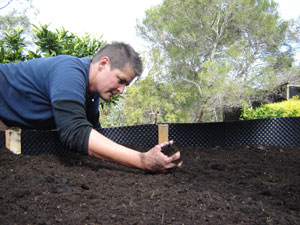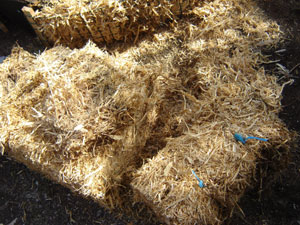
It’s almost impossible not to mention these two topics in the same breath! A great deal has already been written about both, but it is still worth remembering that mulch is the most effective way to keep moisture in your soil. You can choose from a wide range of mulch materials, but remember that it is very important to apply a generous deep layer of mulch.
Don’t be tempted to spread it too thin. If your garden provides you with lots of prunings throughout the year, invest in a shredder and make your own supply of mulch to add to your garden – the ultimate in garden recycling! Mulching also acts to supress weeds, keep soil temperature stable and stimulate microbial activity, meaning less work for gardeners. Mulching should be considered an on-going soil conditioning process, and is as essential in the garden as pruning and weeding.
Natural Soil Improvers
Generally speaking, plants grown in a healthy, well-balanced soil will have an increased resistance to disease. A good garden soil is one that comprises approximately equal parts clay and sand and has a high proportion of humus and organic matter distributed throughout.
Natural Fertilisers & Soil Conditioners
N = Nitrogen, P = Phosphorous, K = Potassium
Compost N.P.K. 1.4-3.5 : 0.3-1 : 0.4-2
Well made compost that contains a large number of ingredients from many different sources will have adequate amounts of most essential major and trace elements. Compost, combined with any animal manures produces the best and safest all purpose fertiliser, containing both major and minor elements.

Animal Manures
Cow: N.P.K. 0.2-2.7 : 0.01-0.3 : 0.06-2.1
Sheep: N.P.K. 1-3 : 0.1-0.6 : 0.3-1.5
All animal manures provide valuable sources of nutritional elements for plant life. When combined with compost as part of the composting process, the final material provides the best all purpose fertiliser. When using manure straight on the garden, care should be taken that it is not too ‘hot’, i.e. that it has been broken down or weathered sufficiently. Use of composted manures eliminates smells and provides five times the nutrition as fresh manures.
Fowl Manure: N.P.K. 4-8 : 1.1-2 : 0.8-1.6
Is very high in nitrogen and phosphorus. Therefore, care must be taken that it is well rotted or composted before applying it to the garden.
Dynamic Lifter: N.P.K. 3.2 : 2.6 : 1.3
An organic general fertiliser based on chicken manure, which is fully processed and sterilised. It is suitable for every feeding situation and application encountered by the home gardener. It is easy to use, non-burning and impurity free. It slowly releases nutrients into the soil as it breaks down.
Blood & Bone: N.P.K. 4.5 : 5 : 0
An excellent nitrogen and phosphorous fertiliser with a relatively high percentage of both major elements.
Hoof, Horn, Hair & Feathers: N.P.K. 11-13 : 0.3 : 0
An excellent slow release high nitrogen fertiliser.
Bone Meal & Ground Burned Bones
An excellent source of phosphorus.
Seaweed Extracts: N.P.K. 0.5 : 0.1-0.2 : 0.1-1.9
There are several commercially available liquid fertilisers on the market, which are very beneficial, particularly for establishing plants and as a tonic for unhealthy plants.
Fish Emulsions N.P.K. 9 : 2 : 6
These are organic liquid fertilisers.
Comfrey leaves
An excellent source of potassium. Use wilted leaves under grass clippings as a mulch around fruit plants. It also makes an excellent compost activator.
Dolomite
A naturally occurring alkaline rock. It is a compound of calcium and magnesium carbonate and excellent when used to neutralise acid soils.
Gypsum
Used to break up the solid mass of clay into a more crumbly structure that can be worked on with compost, mulches and other high humus content materials. Gypsum also contains lots of calcium and sulphur, which are two major plant nutrients.
Wood ash
Scattered in layers in the compost heap, they will do the job of lime in “sweetening” the whole mass.
Leaf mulch
Although leaf litter is not high in nutrients, it has a very important role in the garden, creating within the soil a crumbly (friable) texture, which allows good water retention without water logging. Wherever there is leaf mulch, earthworms will abound. The more worms, the healthier the soil, which is one of our most important natural resources.
Don’t Get Too Wet!
Whatever your soil type, good drainage is essential for healthy plants. Of course, if you have light sandy soil, the drainage is probably too good! This is where the use of compost will greatly reduce rapid moisture loss, and improve the soil’s capacity to retain water, which is really important in these times of water restrictions. Heavy soils also benefit from this process, but some gardens may need more work than others! If you have a brand new house and a bare block of land which only offers compacted clay and subsoil, don’t lose heart; compost can help!
Don’t be tempted to plant straight into compacted clay, as very few plants are tough enough to handle it. Compacted fine clay particles don’t allow water to drain away, so winter rains will cause the roots of plants to rot, and the hot summer sun bakes the clay as hard as concrete! Adding compost and mulching will help improve this soil, allowing water retention and drainage as the organic matter breaks down and mixes with the heavy clay soils.
In addition to a composting and mulching routine, some people opt to import new topsoil into their gardens. The best type of topsoil is a dark sandy loam, rich in organic matter to hold moisture but with enough coarse particles to allow good drainage. So if you need to buy topsoil, this is a very good investment. An important tip when establishing new garden beds is to avoid compaction of the topsoil before planting, although it is important to rake the soil evenly to ensure removal of air pockets. The soil will settle naturally, especially after watering, so you may even find it necessary to ‘top up’ the levels with extra soil after a few days.
Don’t forget to add compost to the soil regularly to encourage lots of worm activity and guarantee excellent drainage!
But why is this so important?
Under the current climatic (and political) conditions, it is unlikely we will ever live in a time without water restrictions again. By developing water wise gardens and adopting water capture and re-use behaviours such as rainwater and greywater usage, the need to irrigate our gardens with drinking quality water is reduced. While plant choice and groupings, environmental conditions and garden micro-climates are all important aspects of a water sensitive garden, a healthy soil is the most important feature of a sustainable, water wise garden.
Healthy soils with high organic matter content require less water, little to no additional fertiliser and are less likely to change structure and performance during long-term irrigation with greywater. Plants in healthy soils will be more vigorous, robust, and less prone to attack from pests and diseases, saving gardeners time and money. In turn, the environment is spared the damaging affects of prolonged fertiliser and pesticide usage… a great result for us, and future generations.
Related Articles:
Fungi: Friend or Foe?
Truffle hunters love them, podiatrists hate them, mycologists are fascinated, and gardeners may have mixed feelings. It is estimated that there are…
Cover Crops 101: The Key to Building Soil Health
Cover crops, also known as green manure, are plants grown primarily to benefit the soil rather than for harvest. These crops play a crucial role in…


